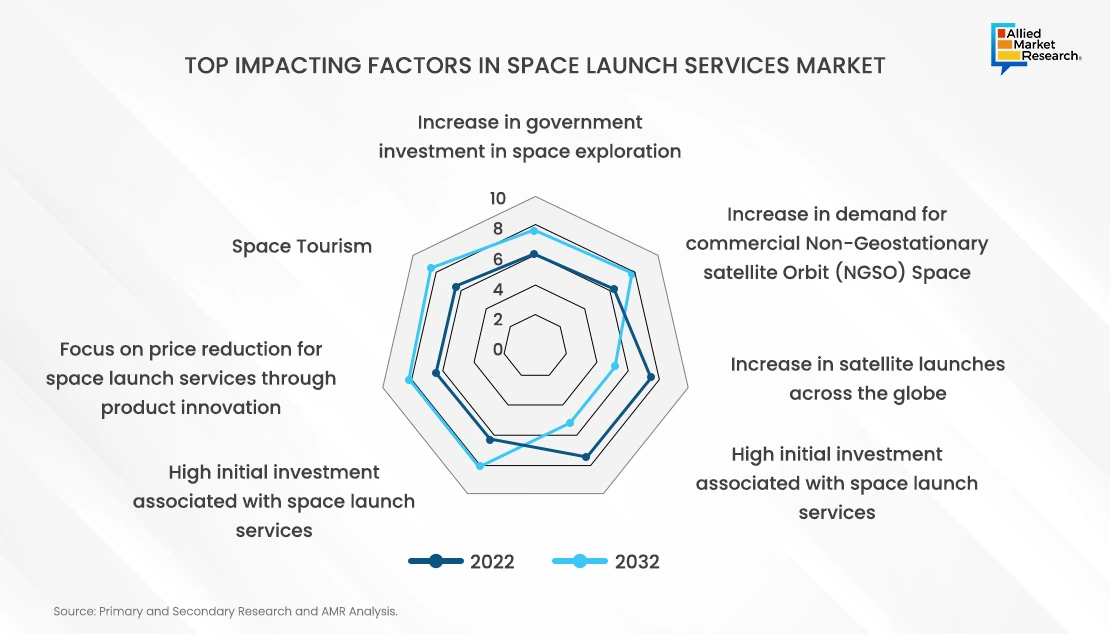Table Of Contents
- Key Components of Space Launch Services
- Factors Impacting the Space Launch Services Market
- Recent Technological Advancements in Launch Vehicles
- Emergence of Small Satellite Launch Services
- Global Collaboration in the Space Industry
- Challenges and Considerations
- Future Outlook and Trends to be Anticipated in the Space Launch Services Market
- Conclusion

Lalit Janardhan Katare

Pooja Parvatkar
Space Launch Services: A Deep Dive into the Key Parameters

Space launch services involve commercial activities which are coupled with the provision of launch vehicles as well as services to deploy payloads, satellites or spacecraft into space. It includes a range of services, from launching small satellites for scientific or commercial purposes to deploying large payloads for surveillance, telecommunications, national security, earth observation, scientific exploration, and others. Companies operating in this industry are also responsible for developing, manufacturing, and operating launch vehicles which is also called as rockets which carry payloads into space.
In recent years, the space launch services market has emerged as a focal point of discussions and analyses within the aerospace industry, making it crucial to shed light on it. The surge in interest can be attributed to a convergence of factors reshaping the dynamics of space exploration. Notably, advancements in reusable rocket technology have substantially lowered launch costs, democratizing access to space. This has led to increased participation from private space companies, fostering innovation and intensifying competition.
Key Components of Space Launch Services
The space launch services market has undergone significant transformation. In the past, it was characterized by limited accessibility, high costs, and primarily government-led initiatives. The market size was smaller, with fewer commercial players, and technology, especially in terms of reusability, was not as advanced. The landscape has shifted dramatically with the entry of private companies, innovations in technology, and increased global collaboration, leading to a more dynamic and competitive space launch services market. The global space launch services market size was valued at $13.9 billion in 2022, and is projected to reach $47.3 billion by 2032, growing at a CAGR of 13.4% from 2023 to 2032.
- Launch Vehicles: Launch vehicles are rockets used to ferry payloads to outer space. There exist various sizes and designs that can accommodate different mission types including deployment of satellites, interplanetary probe launchers or crewed spaceflights.
- Payloads: The payloads vary widely and can include communication satellites, Earth observation satellites, scientific instruments, space probes, and even crewed spacecraft. Payloads are the objects or instruments that the launch vehicle carries into space.
- Launch Services: The companies operating in this sector provide comprehensive launch service packages ranging from mission definition through payload integration till launch vehicle operations and post-launch support activities. Launch service providers collaborate closely with spacecraft agencies together with commercial entities to guarantee successful outcomes for their ventures.
- Commercial and Government Customers: The space launch services market serves both commercial and government customers. Commercial entities may include telecommunications companies, Earth observation firms, and space tourism ventures, while government customers often consist of space agencies conducting scientific research, national defense initiatives, and exploration missions.
Innovation and Technology: Advancements in launch vehicle technologies, propulsion systems, and materials contribute to the continuous evolution of the space launch services market. Reusable rocket technology, in particular, has gained prominence, promising to reduce the cost of space access.
Global Collaboration: International collaboration is increasingly common in the space launch services market, with countries and private companies partnering on missions to share costs, resources, and expertise.
Factors Impacting the Space Launch Services Market
The space launch services market is experiencing unprecedented growth and innovation, driven by an increasing demand for reliable access to space. As nations and private entities continue to expand their space exploration ambitions, the industry is evolving to meet the challenges and opportunities presented by this dynamic landscape.

One of the key drivers behind the surge in the space launch services market is the growing interest from commercial entities. Private companies are entering the space race with ambitious plans for satellite deployments, space tourism, and even establishing satellite constellations for global communication. This influx of commercial demand is reshaping the space launch industry and driving a need for more frequent and cost-effective launches.
Recent Technological Advancements in Launch Vehicles
In recent years, there has been a remarkable surge in the development of advanced launch vehicle technologies. Reusable rocket technology, pioneered by companies like SpaceX, has significantly reduced the costs associated with space travel. This innovation has not only made launches more economical but has also paved the way for an increase in the frequency of launches.
Companies in the market adopt various business strategies such as agreements, product launches and collaborations to have a strong foothold in the market.

Emergence of Small Satellite Launch Services
The rise of small satellites, often referred to as CubeSats, has sparked a new market segment within space launch services. These miniaturized satellites are becoming instrumental in Earth observation, scientific research, and communication. Launch service providers are adapting to cater to the specific needs of small satellite launches, offering dedicated rideshare missions and cost-effective deployment options. Several companies have actively participated in the emerging market of small satellite launch services, providing dedicated rideshare missions and cost-effective deployment options for CubeSats. One notable example is Rocket Lab, a private aerospace manufacturer and small satellite launch service provider. Rocket Lab specializes in small satellite launches and offers dedicated rideshare missions through their Electron rocket. The Electron rocket is designed to accommodate payloads of varying sizes, making it a popular choice for launching small satellites into orbit.
Global Collaboration in the Space Industry
Space exploration has transcended national borders, with countries and companies collaborating on ambitious projects. International partnerships are becoming more prevalent in the space launch services market, fostering shared resources, expertise, and infrastructure. Collaborative efforts are not only driving innovation but also contributing to the sustainability of space activities. For instance, in June 2023, India announced to join the Artemis Accords (a non-binding multilateral arrangement between the United States government and other world governments participating in the Artemis program), on civil space exploration. In addition, NASA and ISRO have agreed to a joint mission to the International Space Station in 2024.
Challenges and Considerations
Despite the promising growth, the space launch services market faces challenges that require careful consideration. Space debris management, regulatory frameworks, and ensuring the safety of payloads are crucial aspects that demand attention. As the industry expands, addressing these challenges becomes imperative to sustain the long-term viability of space activities.

To combat these challenges and risks, key players invest in business strategies such as collaboration, product launches and others.
Future Outlook and Trends to be Anticipated in the Space Launch Services Market
The space launch services market is poised for continued growth, driven by a confluence of factors such as increased commercialization, global collaborations, and technological advancements such as innovations in propulsion technology systems, materials, & manufacturing systems, reusable rocket technology, and use of AI and automation are assisting in launch operations, enhancement of efficiency, and reduced turnaround time. The emergence of new players, including private space companies such as SpaceX, Blue Origin, Rocket Lab, and others, are reshaping the competitive landscape and fostering healthy competition.
Additionally, the prospects of space tourism are gaining momentum, with companies exploring opportunities to offer commercial space travel experiences. As the market evolves, an increased focus on sustainability, cost-effectiveness, and technological innovation is expected to define the trajectory of space launch services.
Conclusion
The space launch services market is at the forefront of a transformative era, where space is becoming more accessible and diversified. The convergence of technological innovation, global collaboration, and a burgeoning commercial space sector is propelling the industry into uncharted territories. As we look to the future, the space launch services market is set to play a pivotal role in shaping humanity's continued exploration of the cosmos. Get in touch with AMR for deeper insights on the market.

